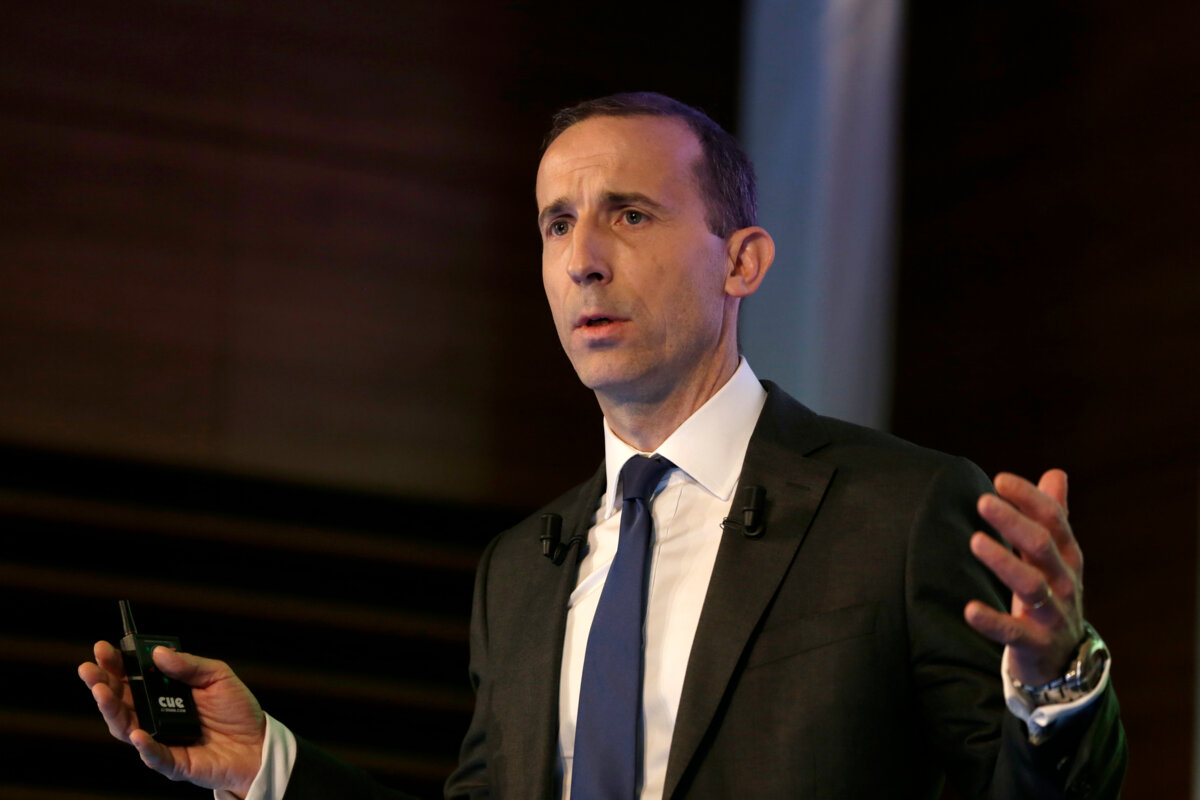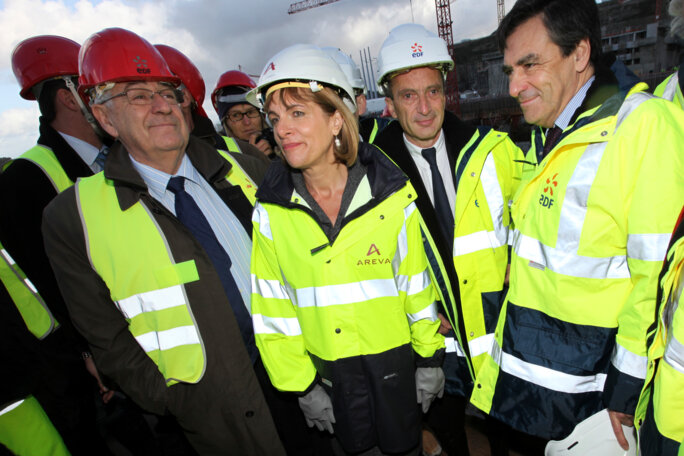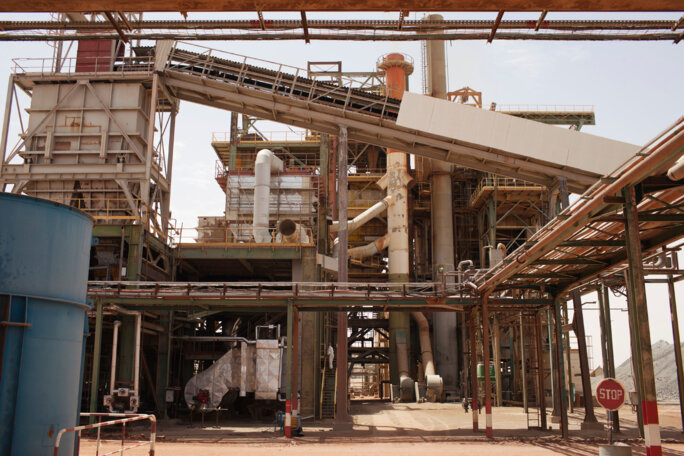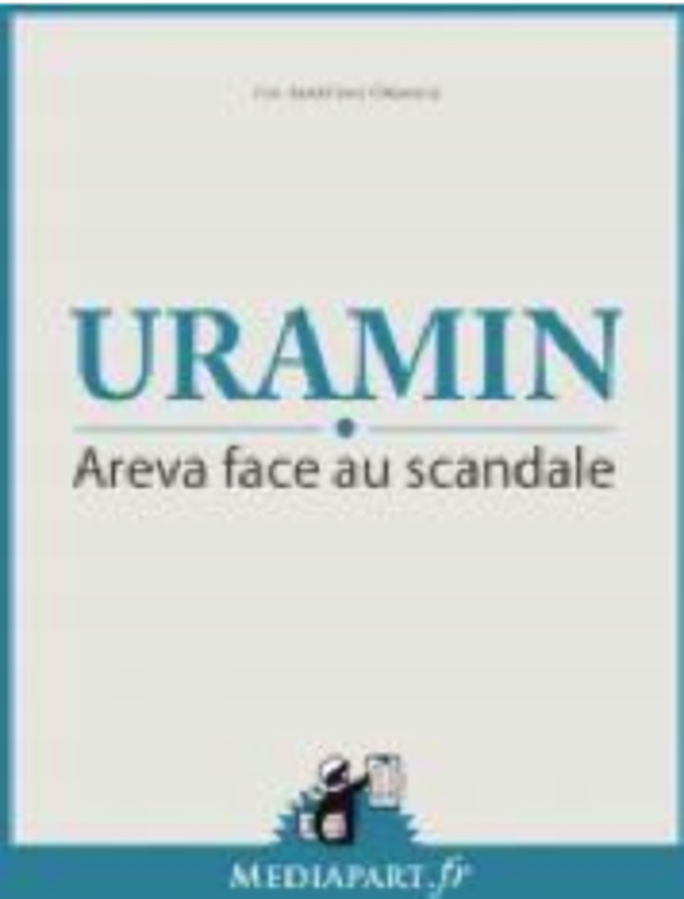In a sense, Areva is already dead. The giant French nuclear group, created thirteen-and-a-half years ago in September 2001, has just foundered on the rocks of its own errors and losses. Even if it survives, even if it keeps its name and some of its current activities, the group will never be the same again. The announcement on Wednesday March 4th that it had lost 4.8 billion euros in 2014 – which comes on top of 500 million euros lost in 2013 and 2.4 billion euros in 2011 – brings to a definitive end Areva's ambitions to be the world's leading nuclear player.
Yet despite the anguished tone of some newspaper editorials, this industrial and financial disaster was only a shock for those who had preferred to look the other way. For the story of Areva is that of a catastrophe foretold. It was not the tsunami-induced disaster at Fukushima in Japan followed by a world-wide retreat from nuclear that are at the origins of Areva's setbacks. This downturn has simply exposed the group's existing internal problems.

Enlargement : Illustration 1

Indeed, Areva has not had an operating profit since 2007. To put it another way, the group, which is 87% owned by the public body the Commissariat à l'énergie atomique et aux énergies alternatives (CEA) and the French state directly, has been eating up cash to carry on operating. And all the signs of serious industrial, financial and strategic failings have been piling up since 2009. Yet from the Elysée to the French finance ministry, not forgetting the group's supervisory board and its auditors, everyone in a position to ask questions has opted either to simply show collegiate loyalty towards fellow public servants at Areva or to play politics. And all preferred to close their eyes to the problem.
After 2009 people familiar with the group's operations were no longer under any illusion: the EPR, the third generation pressurized water reactor that was supposed to be at the heart of Areva's strategy, was in the process of turning into a fiasco. It was not just the delays in building a reactor on Olkiluoto Island in Finland, which at least has the excuse of being a prototype, which have caused a problem. Areva has also had difficulties in the construction of a new nuclear plant at Flamanville in north-west France and, to a lesser degree, in China too.
All these problems, which were for a long time swept under the carpet, have ended up making an appearance in the latest accounts. The group has made provision for a 1.4 billion euro depreciation in its nuclear assets and more than a billion euros in losses over the completion of the construction of the three EPR reactors. The Finnish project alone cost 700 million euros in additional losses in 2014. The overall bill for the Finnish reactor has already reached more than 8 billion euros though it was sold to the Finns for 3.5 billion euros. And it is still not yet finished. The EPR reactor there is not now due to be ready until 2018. “Each year of delay costs Areva 400 million euros,” explains a former employee at the group.
Though the scale of the financial problems at Flamanville is not as great as at the Finnish project, it is still a cause for concern. The EPR there should have been in action in 2012 but following delay after delay it is not now expected to be in service until 2017. Already the cost of the build has topped 8.5 billion euros, three times more than originally forecast. The cost per megawatt hour (Mwh), which at the start was estimated at 46 euros, is now put at more than 116 euros. “As it is currently conceived the EPR will never be profitable,” says someone who knows the issue well.
For a long time the desire to cultivate a prickly independence - carefully put in place by the former president of the group Anne Lauvergeon with the help of showy public relations and highly-publicised confrontations and plots - a management that covered everything up and political silence about “one of France's technological shop windows”, all combined to make it difficult to appreciate the scale of the difficulties. It is only since 2013, once relations between Areva and its main client, electricity producer EDF, had become calmer, that the two groups have started to work together again and have begun examining the EPR dossier from the beginning. How many millions or even billions were wasted over turf wars, or in the stroking of egos?
During this period the group exhausted itself financially to pretend that all was well. Everything possible was done to hide the true situation. From 2008 the group began selling some 7 billion euros of assets in a bid to bail itself out. But in vain. Then in 2013 it offloaded part of its strategic stocks, selling off 42% more uranium than in 2012 with the aim of being able to show slightly more presentable results. This sleight of hand could not be repeated in 2014. Following new depreciations in its mining assets, in particular those linked with the Uramin scandal, the group's mining operations posted an operating loss of 73 million euros in 2014, against a profit of 499 million euros in 2013. Up until then it had been the only one of the group's businesses that had been profitable.
This indeed is Areva's other great disaster. Not only has its flagship reactor business gone badly wrong, but so have all its other activities, those which were supposed to have justified the structure of a group that followed the entire nuclear process from mining to the treatment of nuclear waste. This set-up was supposed to give the group a solid basis and protect it in case of difficulties during a cyclical downturn. For some of the sectors, such as the treatment of waste, the current difficult patch is perhaps just short-term. But for others the situation looks much bleaker.
'There are no quick fixes'

Enlargement : Illustration 2

The biggest problem appears to be with the group's renewable energy arm. Once again an examination of the figures shows that the alarm bells should have been ringing for several years.
In the middle of the 2000s Anne Lauvergeon decided Areva should go green and portray itself as a group specialising in energies that do not produce CO2. So it spent hundreds of millions of euros to acquire companies that specialised in renewable energy, notably in offshore wind turbines and solar.
This attempt at diversification has been a failure. The business has a mediocre turnover – barely 50 million euros a year – and has steadily accumulated losses. In 2014 the overall deficit was 1.5 billion euros. In the 2014 accounts the group has posted losses of more than 770 million euros in depreciations and other provisions for renewable energies. The new management, headed by Philippe Knoche, who had been director of strategy and was in charge of the Finnish project, seems ready to draw a line under it.
All parts of the renewable energy arm have been earmarked as assets to sell off. “Areva could perhaps keep a part of its solar business. With LETI [editor's note, one of the CEA's research centres] the group has developed some very interesting technologies but which are not yet in production,” says one expert.
“In contrast, there is no hope for the offshore wind turbines. Every group has come a cropper on them. Iberdrola [editor's note, a Spanish electric utility company], who had staked a lot on developing them, is in the process of withdrawing. People have realised that offshore turbines are very hard to put into operation, and cost a lot to operate and to maintain. The real cost per megawatt hour is around 200 euros,” says the expert.
The withdrawal from renewables, which is apparent in the accounts but which is not yet being officially discussed, might end one source of losses but on its own it will not be enough for the group to recover. In 2014 Areva's overall trading performance - its consolidated net income - was in the red to the tune of 4.83 billion euros. Given that all its businesses are loss-making, what can the group's management do?
Philippe Knoche, who took over as chief executive officer after the departure of Luc Oursel, who stood down for health reasons in October 2014 and who subsequently died in December, has announced a complete overhaul of the group's strategy. The first objective is a plan to save a billion euros, which should allow the group to return to an operating profit in 2017. Observers say this plan is going to require some drastic rethinks. “Whatever the options that are chosen, there are no quick fixes for the business's difficulties,” says someone with a close working knowledge of the group.
The primary task of management is to focus all its efforts on the EPR and its nuclear know-how and try to salvage what they can. Though in the past Areva has shown a fierce desire to keep its distance from its big client EDF, the group now seems to expect everything from the electricity producer: that it helps Areva redesign a more economic reactor, that it buys EPR reactors or even that EDF takes the stricken group under its wing. The French government seems tempted by this last possibility, as it would avoid the need for the state to recapitalise Areva out of its own pocket. “There must be a convergence between Areva and EDF … this could be greater industrial cooperation or go as far as a merger, including of capital,” the minister for the economy Emmanuel Macron said in an interview with Le Figaro.
Engineers at Areva and EDF started working together again at the end of 2013. They are in the process of going back to square one on the conception of the EPR to try and find a way to produce it 20% to 25% more cheaply. Other teams are looking to see if it is possible to start all over again with the latest generation of reactors currently used by EDF to improve and create a new generation that is much cheaper and less complex than the EPR. “Though it is logical to bring the two groups' teams of engineers together, it would equally be a mistake to transform Areva into a subsidiary of EDF. The integrated model of [Japanese electricity producer] TEPCO doesn't work with EDF. I understand that it would suit the state. But that solution would bring more disadvantages than advantages,” says a close observer.
This view is shared by EDF. The giant electricity producer has absolutely no desire to become responsible for Areva's future. “It is not in EDF's interests to take control of Areva. First of all, EDF doesn't have unlimited resources. Moreover, its strategy is more to develop renewable energies and to prolong the life of existing reactors. That is a much more profitable and economic solution than buying EPRs,” says a senior EDF source.
The only other domain where the two groups can see themselves working together without any problems is in international cooperation. The failure to win a lucrative nuclear contract with the United Arab Emirates in 2009, in which Areva pitched with French oil company Total and French gas company Suez, with EDF only joining the bid as a partner later – apparently on the orders of the Elysée - has left bitter memories. The two groups have admitted that they cannot afford the luxury of indulging in French infighting abroad. They even seem ready to enlist third parties in large-scale international projects; the groups consider that they need allies to take French nuclear know-how abroad in the face of competition from the Chinese, Russians, Koreans and the Americans. In particular they would like an alliance with the Chinese, with whom they have worked since 1980.
The nomination of Philippe Varin, who is both a director at EDF and chairman of the board at Areva, is supposed to illustrate this new approach. The task of the former head of French car giant PSA Peugeot Citroën is not only to forge links between the two former close enemies of the French nuclear industry, but also to open the doors to China. The French government and senior civil servants believe he is the man for the job: though he headed a firm that made cars, it was Varin who negotiated the deal between Peugeot and Chinese manufacturer Dongfeng. In the corridors of power in Paris, they would like to see a similar outcome in China with Areva.
In its first public declarations on its new direction, Areva's management certainly backed the idea of strategic development with China. “The Chinese came and suggested this form of cooperation in 2010,” says one close observer. “But neither [President Nicolas] Sarkozy or [President François] Hollande followed it up. We've lost four years. But are they still enthusiastic?” The observer continues: “The right partner would be Russia. Rosatom [editor's note, the Russian state nuclear company] picks up many contracts abroad with technology that's less sophisticated than ours. But it has problems with industrialising and operating [projects]. EDF and Areva could bring them their know-how. But are we ready politically to take that step?” Just to ask the question in today's geopolitical climate is to provide the answer.
'Our executives' oversized egos'

Enlargement : Illustration 3

Alongside these attempts at international tie-ups, there are plans for deep internal reorganisation within the group. If the waste treatment business seems untouchable – for strategic and security reasons – the future of the rest of the group seems up for negotiation. Turning the group's mining business into a standalone subsidiary is one idea that keeps coming up. The idea has been floated since 2009, when Areva underwent its first financial crisis. Anne Lauvergeon used all her powers to reject it. But now that it is in such a parlous state financially, the group can no longer oppose the idea. However, even if this easy solution could help bail out the group, it would have serious consequences. Not only would Areva partially lose one of its sole businesses guaranteed to make a profit, it would also signify that the great project of integration that was behind the creation of the group in 2001 is finally dead. The old company Cogema, which was merged with other businesses back then to form Areva, would regain its independence.
Some industrial and manufacturing sites at the group could also be under threat. However, at the moment there is complete uncertainty over which. The government itself says it is waiting for the group's reorganisation plan. “We'll have to see what happens at the political level,” says one well-placed source. Indeed, many senior socialist politicians will be watching the outcome of the group's deliberations with particular interest. Areva owns sites producing turbines in the fiefdom of former prime minister Jean-Marc Ayrault in west France, and wind turbines in Brittany – a region close to the heart of defence minister Jean-Yves Le Drian – it has boiler works in Saône-et-Loire, the département or county that is the stronghold of former minister for the economy Arnaud Montebourg, while some of its reprocessing work is carried out in La Hague, the bastion of interior minister Bernard Cazeneuve. This all suggests there will be numerous interventions and much political wrangling at the highest levels of state.
As for Areva's workforce, they are under no illusions. They already know that they are the ones who will pay a heavy price for the group's past errors. Rumours have already started circulating that 2,000, 3,000 or even 4,000 jobs could go. For the moment they are without foundation as everything will depend on how the reorganisation is carried out, whether some of the businesses are completely sold off or not, whether some sites are closed outright or whether the management prefers to make cuts across the board.
The management has, meanwhile, pledged to the workforce and the government that it will carry out an exemplary social dialogue over its reorganisation plans. Some employees hope that Areva will implement a plan of voluntary redundancies, similar to the one carried out by Air France. It is an expensive solution but has the advantage of not provoking too much unrest among the workforce.
This matters, because everyone fears the reaction of the trade unions at the group. “That's one of the reasons why [economy minister] Emmanuel Macron has not announced the level of re-capitalisation that the state might provide for Areva,” says a senior source. “First of all, because it's still too soon to evaluate the group's real needs, because everything depends on its restructuring plan. But it also puts pressure on the unions and encourages them to make compromises.”

For the moment the unions represented at the group are asking for explanations while doing their own sums. They all reject the idea that the employees should be the only ones sacrificed because of past errors. “Not a single employee of the Areva businesses is responsible for this group's débâcle and its debts,” said the CGT union branch at the group in a statement on March 4th. The statement then went on to point out where, in the union's view, the blame really lay: “This situation is due to a total absence of long-term vision and to the disengagement of the state for around 15 years. Whether its EDF, Areva or the CEA, the state has allowed the markets and our executives' oversized egos to call the shots in the electricity-nuclear sector.”
Though they are doing their best to avoid the subject, the state and the top echelons of the civil service cannot escape their responsibilities over the fiasco. The Areva adventure has cost more than eight billion euros, in other words two thirds of the current pension deficit in France. Yet while the pension deficit is regarded as unacceptable, and there is more talk of increasing the retirement age in France, in Areva's case it is only the workforce who will pay the price. The taxpayers, meanwhile, will be asked to bail out the nuclear group without being able to hold anyone to account.
For the Areva disaster is not just an industrial failure. It also stems from serious dysfunctions, from a chain of responsibilities that no one today is prepared to accept. There is a strong temptation to blame all the mistakes on Anne Lauvergeon, who enjoyed almost monarchical power. And she indeed bears immense responsibility for what went wrong. But she is not the only one. There are rules and procedures that normally allow a business to avoid its management's excesses, not to mention the many warnings that have been passed on to the highest levels of the state since 2008.
There are, in particular, question marks over the astonishing silence of certain individuals who had the means to stop this disaster. Why did Jean-Cyril Spinetta, president of the surveillance committee from 2007 to 2012, the period when it all began to unravel, endorse everything? What were the directors at the CEA, the main shareholders in Areva, doing all that time? How can one explain how Bruno Bézard, who is today director general of the French Treasury, saw nothing and foresaw nothing when he was a director at the group, sitting on the strategic and accounts committees, from 2001 to 2010? What was the point of the 2010 expert's report carried out by financial expert René Ricol, who was then co-president of the group's audit committee, other than to give carte blanche to the management and board of directors, even though all the blunders were already in the process of being committed? Why did France's audit court, the Cour des Comptes, wake up so late to what was going on and only start to examine Areva's accounts in detail in 2013? To this long chain of responsibility one could also add the silence of the group's auditors and the blindness of the financial markets authority, the Autorité des Marchés Financiers (AMF).
“It would be a first in France if they dared to question the responsibility of the executives and the senior civil service,” says one observer. Yes, it would be a first. But in this period of austerity the loss of eight billion euros justifies calling for some explanations. Unless it is considered that some people should be given immunity as a matter of principle, whatever the excesses and the industrial and financial waste, and whatever their actions.
-----------------------------------------------------------------------
- The French version of this article can be found here.
English version by Michael Streeter


